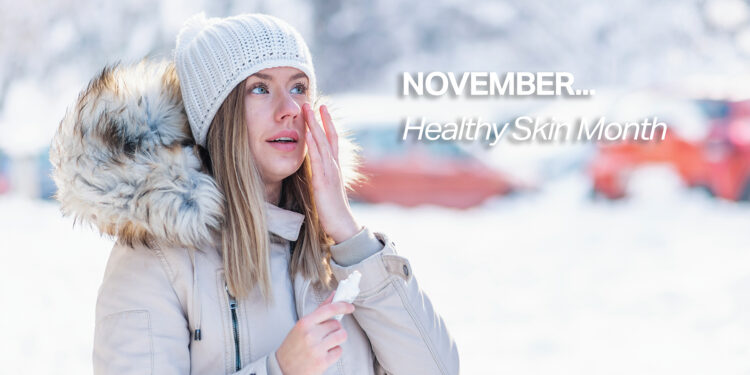November is Healthy Skin Month

Story by Ciara Sophia
Your Essential Guide to Healthy, Glowing Skin All Season Long:
A nearly universal step in everyone’s self-care regimen involves taking good care of our skin. As the temperatures drop and the air becomes crisp, this can become more difficult as the colder months take a toll on our skin. The harsh, cold Kansas City wind and indoor heating systems strip away moisture, leaving skin flaky, irritated, and thirsty for hydration. However, there’s good news too! With a few thoughtful adjustments to your skincare routine, you can maintain a healthy, radiant complexion throughout the winter and beyond.

John F. Rupp, MD
John F. Rupp, MD, owner of Dermatology Specialists of Kansas City generously shared various ways we can ensure our skin will thrive throughout Kansas City’s rough winters. First, Dr. Rupp spoke on the reasons that our skin suffers from dryness and irritation within the colder months. Although there are several factors that lead to this unhappy skin, “The main factor in the winter is the dry air. This lack of humidity causes the moisture on the skin to evaporate more easily. Thus, leaving dry, dull, scaly skin,” Dr. Rupp explained.
On another note, eczema and psoriasis are both inflammatory conditions to the skin. For people who have either of these skin-conditions, the moisture barrier of the skin does not work as well, causing the skin to dry out quicker. “Consequently, many who suffer from eczema and psoriasis have more trouble with their skin in the winter due to the lack of humidity in the air.” Dr. Rupp lists many of the different reasons why this is, “Often, when it is cold out, people tend to take hot showers. While hot showers may feel good, they cause the moisture on the skin to evaporate more readily. Harsh soaps will destroy the natural oils that the skin needs to properly function. Dermatologists will tell you that stress can make conditions like eczema and psoriasis worse. Sometimes the type of clothing can add to dryness and itching; wool clothing is a prime example of a material that can irritate the already dry skin. Non-breathable clothing and that huge parka can also predispose you to sweat more; sweat can irritate the skin especially when the skin is already damaged with eczema or psoriasis.”
Now for the million-dollar question everyone’s been waiting for, “What can be done to prevent this itchy, dry skin?”
Well, Dr. Rupp has a bundle of tips and tricks that he has shared with us. Whether one has eczema, psoriasis or normal skin, here are a few recommendations to keep the skin healthy during the winter months:
1.) Make sure you have an evaporative humidifier in the home. That humidity is key to keeping the skin’s surface hydrated.
2.) When showering, keep the water at a comfortably warm (NOT hot) temperature.
3.) Showering with a gentle, and possibly hypoallergenic soap is also important.
4.) When drying off after a shower or bath, pat the skin dry where you can. Firm rubbing with the towel on the skin can irritate the skin’s surface and disrupt the moisture barrier.
5.) Applying a thick, rich moisturizer one or more times a day will keep the skin’s moisture barrier intact and healthy. Lotions are okay but, on average, creams do a better job at replenishing moisture to the skin. Some moisturizing creams contain ceramides, which help to repair and preserve the skin’s moisture barrier.
6.) When dressing to keep warm, dress in layers so that you can regulate your body’s temperature more easily. Removing a layer or two before the profuse sweating ensues is a good way to prevent that damp irritation to the skin. Breathable clothing like cotton is recommended.
7.) For those with eczema or psoriasis, this time of year might be great for a sunny vacation, as many Dermatologists recommend a little bit of ultraviolet (UV) light exposure to keep the rash in check.
8.) As discussed, stress can make your psoriasis or eczema worse. Finding a hobby or a project can allow your mind to escape the holiday stressors for a bit. Meditation, yoga, or a good book might also do the trick.
9.) Don’t forget to keep the lips lubricated with a thick hypoallergenic balm or ointment.”

On top of all of that, Dr. Rupp has a few more pieces of winter-specific advice for us to keep our skin healthy. Reminder: sunscreen is still important during the winter! Dr. Rupp reveals, “Most dermatologists recommend wearing sunscreen not only in the spring, summer, and fall, but also in the winter months. When the sun is in the southern hemisphere during the winter months, the UV light is slightly weaker but can still contribute to skin damage.
If you are going to be outside for more than 15 minutes, apply sunscreen with at least an SPF 30. I recommend an SPF 50 or higher for those who are going to be at higher altitudes (skiers), as the UV radiation is stronger at higher altitudes. Remember that it is not the heat of the sun but the UV light that reaches the earth, even through the clouds. Also, surfaces like snow and ice can reflect UV light. Thus, it’s a double whammy for skin damage.”
Finally, in terms of the frequency of visits to your dermatologist, Dr. Rupp has stated that any time of the year is a good time to visit the dermatologist in order to screen for skin cancers and ensure healthy skin! Dr. Rupp states, “I recommend that every adult have a baseline skin exam to determine if there are any questionable lesions. At this baseline visit, the dermatology provider can determine the person’s overall risk of developing skin cancer based on prior sun exposures, family history, and melanin content of the skin. If children and teenagers have a family history of skin cancer or they have several moles, it is recommended that they have a baseline skin exam as well. At that visit, the dermatology provider can then discuss with the parents how often their child should have a skin exam.”
In conclusion, keeping your skin healthy during the winter months doesn’t have to be a daunting task. Through following Dr. Rupp’s advice, staying hydrated, moisturizing regularly, protecting your skin, and making small adjustments to your routine, you can enjoy soft, glowing skin even with the Kansas City cold.
For more information, visit The American Academy of Dermatology at www.aad.org and John F. Rupp, MD with Dermatology Specialists of Kansas City at www.dermkc.com.






